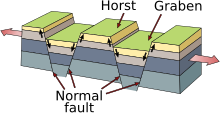graben
English

Etymology
Borrowed from German Graben (“ditch”), from the verb graben (“to dig”).
Noun
graben (plural grabens or graben)
- (geology) An elongated block of the Earth's crust, bounded by faults, that has dropped relative to the surrounding area.
- Antonym: horst
- Coordinate term: fault
- Hyponym: rift valley
- 1959, Robert G. Yates, George A. Thompson, Geology and Quicksilver Deposits of the Terlingua District, Texas, U. S. Geological Survey, Professional Paper 312, page 49,
- The magnitude and shape of the large grabens strongly suggest that, when they formed, material much more mobile than ordinary rocks was present at a depth no greater than a few miles.
- 1969, V. V. Beloussov, Contintal Rifts, Pembroke J. Hart (editor), The Earth's Crust and Upper Mantle, page 539,
- This system includes the Syrian and Lebanese grabens; the grabens of the Dead Sea, Wadi al Arabah, Gulfs of Aqaba and Suez, Red Sea, and Gulf of Aden; and the Ethiopian graben.
- 1997, Jean-Marie Rouchy, 2: Paleogene Continental Rift System of Western Europe, Georges Busson, B. Charlotte Schreiber (editors), Sedimentary Deposition in Rift and Foreland Basins in France and Spain (Paleogene and Lower Neogene), page 83,
- Migration of the subsidence axis has been revealed by the detailed sedimentological studies in most of these grabens, particularly in the Bresse basin (Curial 1986; Moretto 1986/1987) and in Manosque-Forcalquier.
- 2015, C. F. Burgess, et al., Chapter 35: The Structural and Stratigraphic Evolution of Lake Tanganyika: A Case Study of Continental Rifting, W. Manspeizer (editor), Triassic-Jurassic Rifting: Continental Breakup and the Origin of the Atlantic Ocean and Passive Margins, Part A, page 866,
- These distinct zones of strike-slip or scissor faulting which separate adjacent half-grabens were termed interbasinal ridges and hinged highs by Rosendahl et al. (1986).
Derived terms
Translations
elongated block of the Earth's crust that has dropped relative to the surrounding blocks
Further reading
Anagrams
German
Etymology
From (deprecated template usage) [etyl] Old High German graban, from (deprecated template usage) [etyl] Proto-Germanic *grabaną, from (deprecated template usage) [etyl] Proto-Indo-European *gʰrābʰ- (“to dig, scratch, scrape”). Cognate with English grave (“to dig”).
Compare Serbo-Croatian grȍb and groblje (“grave”), German Grab (“grave”), (deprecated template usage) [etyl] Czech and (deprecated template usage) [etyl] Slovak hrob (“grave”), (deprecated template usage) [etyl] Polish grób (“grave”).
Pronunciation
Verb
- (transitive or intransitive) to dig
- (transitive, intransitive or reflexive, of an animal) to burrow
Conjugation
Derived terms
Related terms
Further reading
- “graben” in Duden online
Spanish
Verb
graben
Categories:
- English terms borrowed from German
- English terms derived from German
- English lemmas
- English nouns
- English countable nouns
- English indeclinable nouns
- English nouns with irregular plurals
- en:Geology
- German terms derived from Old High German
- German terms derived from Proto-Germanic
- German terms derived from Proto-Indo-European
- German terms with audio links
- German 2-syllable words
- German terms with IPA pronunciation
- German transitive verbs
- German intransitive verbs
- German reflexive verbs
- Spanish non-lemma forms
- Spanish verb forms
- Spanish forms of verbs ending in -ar